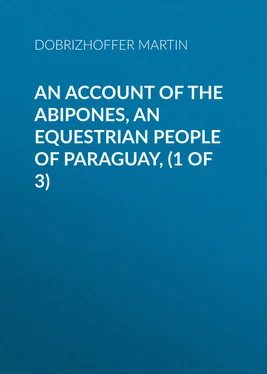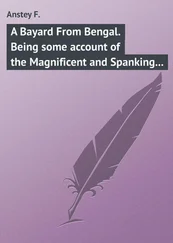Martin Dobrizhoffer - An Account of the Abipones, an Equestrian People of Paraguay, (1 of 3)
Здесь есть возможность читать онлайн «Martin Dobrizhoffer - An Account of the Abipones, an Equestrian People of Paraguay, (1 of 3)» — ознакомительный отрывок электронной книги совершенно бесплатно, а после прочтения отрывка купить полную версию. В некоторых случаях можно слушать аудио, скачать через торрент в формате fb2 и присутствует краткое содержание. Жанр: foreign_antique, foreign_prose, на английском языке. Описание произведения, (предисловие) а так же отзывы посетителей доступны на портале библиотеки ЛибКат.
- Название:An Account of the Abipones, an Equestrian People of Paraguay, (1 of 3)
- Автор:
- Жанр:
- Год:неизвестен
- ISBN:нет данных
- Рейтинг книги:3 / 5. Голосов: 1
-
Избранное:Добавить в избранное
- Отзывы:
-
Ваша оценка:
- 60
- 1
- 2
- 3
- 4
- 5
An Account of the Abipones, an Equestrian People of Paraguay, (1 of 3): краткое содержание, описание и аннотация
Предлагаем к чтению аннотацию, описание, краткое содержание или предисловие (зависит от того, что написал сам автор книги «An Account of the Abipones, an Equestrian People of Paraguay, (1 of 3)»). Если вы не нашли необходимую информацию о книге — напишите в комментариях, мы постараемся отыскать её.
An Account of the Abipones, an Equestrian People of Paraguay, (1 of 3) — читать онлайн ознакомительный отрывок
Ниже представлен текст книги, разбитый по страницам. Система сохранения места последней прочитанной страницы, позволяет с удобством читать онлайн бесплатно книгу «An Account of the Abipones, an Equestrian People of Paraguay, (1 of 3)», без необходимости каждый раз заново искать на чём Вы остановились. Поставьте закладку, и сможете в любой момент перейти на страницу, на которой закончили чтение.
Интервал:
Закладка:
Some years after, I was sent by the superior to the city of St. Joachim. The rumour concerning the Indians of Mbaeverà continued to spread, and with it the fear of the Spaniards, who durst not even approach the woods, which promised so abundant an harvest of the herb of Paraguay. Under the conduct of Vilalba, I set out with five and twenty Indians, through marshes and rivers. The bridges and other aids, prepared to secure the passage of the Spaniards, had long perished. Every obstacle however being overcome, we arrived at the place in question, and discovered the remains of the savage hut. The bones of apes, boars, and antas, a wooden mortar, a few grains of maize, and other things of this kind, were discovered there; a path leading to the river side, well trod with the naked feet of the Indians, was also visible; but not a single recent vestige could we any where detect, though for many days we attentively searched both the neighbouring woods, and the banks of the river Acaraỹ. After having traversed the mournful solitude eighteen days, and suffered what neither I can describe nor my reader credit, as no hope remained of finding the Indians, we returned to the town, the improvement of our patience being our only recompense. I walked the whole way, and often barefoot. Had I turned ever so little from the east to the south, we should have found the habitations of the savages, as was proved to me the following year. The Spaniards, being made acquainted with my diligent search of the forest of Mbaeverà, persuaded themselves that the savages had migrated elsewhere, and accordingly set out thither in great numbers. But, lo! in the course of their business, they perceived the savages dropping in upon them one after another. Conciliated by familiar discourse, and presents of beef and other trifles, they seemed to entertain no hostile sentiments, but visited the dwellings of the Spaniards in friendly guise. To enquiries concerning their place of abode, they replied that it was at a great distance, and could only be approached by crossing many marshes; a cunning answer, dictated by their fears for themselves and their wives, if visited by the Spaniards. Lest their footsteps should betray their resorts, in returning home they practised the following artifice: if they went by a southern, they returned by a northern road, and contrariwise, so that the Spaniards could not form an idea of the place where they lurked. And thus the savages and Spaniards suspected one other, and their mutual distrust increased every day.
Vilalba, alarmed for his own safety, informed me how matters stood, and assured me of success in discovering the savages if I would only renew the attempt. I undertook the journey without delay. But scarcely had two days elapsed, when all the rain in heaven seemed combined to overwhelm us, and after eight days of misery, compelled us to return, from the certainty of still greater wretchedness, if we proceeded. Twenty days the obstinate rain continued, yet we did not think our business desperate, and on returning to the town, I impatiently awaited an opportunity of renewing it. Not long after, I undertook a third expedition, which proved successful. At length I reached my post, discovering three tolerably populous hordes, over whom presided as many caciques; Roy, Tupanchichù, and Veraripochiritù. The first hut we met with was built of palms, interwoven with dry grass, opening by eight doors and containing sixty inhabitants. Here and there hung nets which are used both to sleep and sit in. Each family has its own fire, on the hearth around which stand a multitude of pots, gourds, and mugs. They are generally handsome, particularly the youths; from never being exposed to the sun their faces are fair. The males of every age shave their heads, a circle of hair being left on the crown. At seven years old they have their under lip pierced, and insert a reed of the thickness of a quill into the hole. All of whatever sex or age hang a common triangular shell in their ears. The men go almost naked, wearing nothing but a narrow girdle round their loins, but the women are covered from head to foot, with a white garment manufactured from the bark of the Pinò. These savages ornament their heads with crowns of long parrot feathers, disposed with considerable elegance. Their arms consist of barbed arrows, with which they shoot even little birds on the wing with great dexterity. They maintain themselves and their families by the chase. They often lurk in thickets, for the purpose of shooting or ensnaring antas, which they inveigle by a skilful imitation of their bray; nor are they wholly averse from agriculture. In these woods there is an amazing produce of maize, and other fruits, as also of tobacco. On going to bed they put their pots full of flesh or vegetables on the fire, that their breakfasts may be ready when they awake: for at earliest dawn, the males, from seven years old and upwards, traverse the woods with a bundle of darts, in search of that game, on which they must subsist for the day. The mothers put their babies in wicker baskets, and carry them on their shoulders, when they travel in the woods. From the hives with which the trees abound, they collect quantities of most excellent honey, serving both for meat and drink. Their name for God, in the Guarany tongue, is Tupà , but of that God and his commandments, they care little to know. They are as ignorant of the worship of idols, as they are of the Supreme being. The spirit of evil they call Aña or Añanga, but they pay him no adoration. The magicians, or more properly imposters, who arrogate to themselves full power of warding and inflicting disease and death, of predicting future events, of raising floods and tempests, of transforming themselves into tigers, and performing I know not what other preternatural feats, they religiously venerate. Like other Americans, they think polygamy allowable, but rarely avail themselves of the license: from which circumstance, repudiation is frequent among them. Marriage with the most distant relations they shun as highly criminal. They inclose their dead in large vessels of clay, according to an old Guarany rite. What their fate after this life may be, they never trouble themselves to enquire. They do not feed on human flesh to my knowledge, though the neighbouring Indians reckon it a delicacy. Every stranger whatsoever, Indian, Spaniard, or Portugueze, they suspect of hostile intentions, and receive in arms, believing every other race their enemies and designers on their freedom. They harboured the same suspicion with regard to me and my Indian comrades, when they saw us coming.
The first whom we discovered in the woods was a fine young man holding a bird like our pheasants, expiring in his hand. I approached the astonished youth, complimented him upon his singular skill in archery, and, as gifts prevail more with the Indians than fine words, presented him with a piece of roast meat, which he devoured with all the avidity of hunger. This unexpected breakfast dissipated the alarm which the sudden appearance of strangers had excited. His name was Arapotiyu , or the morning: for in the Guarany tongue ara signifies day , poti the flower , and yu whatever is yellow or golden ; so that by the golden flower of day they express the morning. And from this morning we discovered that the sun , Captain Roy, the principal cacique of the vicinity, was the youth's father. For whatever questions I put to him, he quietly answered, and said, that his father was occupied in hunting, not far distant. "Come then," said I, joyfully, "conduct us to him as quickly as possible." To this the youth willingly assented, keeping close to my side the whole way. Having proceeded through the woods for the space of an hour, we beheld an emaciated old man, armed with an immense knife, and creeping at a snail's pace, accompanied by two youths (his son and a captive) furnished with a bundle of arrows. The Indian Christians who were with us bent their bows and the points of their arrows to the ground, to testify friendship, on approaching him; one of the more aged of my companions kissed the left cheek of the cacique, as a sign of peace, and explaining the reason of our coming, said, "God save thee, brother! See, we are come to visit you as friends, for we think you akin to us. And this father-priest, whom we attend, is the minister of God himself. He teaches us, feeds us, clothes and tenderly loves us; for when he buries our dead, wrapped in a white cloth, he chaunts over us." My Indian would have spoken more, but the old man interrupted him with an ironical and angry exclamation of Hindo! repeated several times. He vehemently denied that any relationship existed between them, and regarded us with the most wrathful aspect, supposing us to be Spanish or Brazilian Portugueze Indian-hunters. Then addressing himself to me, he angrily said, "You are come in vain, father-priest: we don't want a father-priest. St. Thomas long ago prayed enough for our land. All kind of fruits grow in plenty here." For the rude savage thought the presence of a priest useful only in procuring fertility to the soil. "Granting," I replied, "that St. Thomas was formerly in your territories, yet whatever he taught your ancestors of the Supreme Deity and his laws has long since escaped your memories. I am ready to repeat his instructions. But, bless me, good old man, why do we stand talking in the mud? why don't we sit down on the trunk of the tree, which is out of the swamp?" Accordingly we sat down, and I detailed to him the occasion and the hardships of my long journey. To win the good-will of the surly old man, I ordered a choice piece of roast meat to be brought him, which he greedily seized and devoured. His hunger appeased, his jealous mind began to soften, and I tried all ways to find an entrance to his heart. To this end, I offered him some snuff, but pushing it from him with both hands, he answered, " Aquihiye ," I fear it, supposing it magical powder, possessed of the power of charming. I then opened to him my design of visiting his horde, but he argued it to be impossible. "My residence," says he, "is very far distant from hence. Three rivers, as many marshes, and the worst possible roads intervene." "By this argument," answered I, "you can never divert me from my purpose, who, after a journey of so many days, have succeeded in overcoming so many rivers and marshes, and such woods." "But you must know," opposed the old man, "that my health is not very good, and that I feel myself unequal to the journey." "I can easily believe that," was my answer, "when I am daily made sensible of my own ailments. And no wonder: the badness of the weather, the copious rains, the wet forest, the muddy roads, the long marsh, which I crossed up to the knees in water, the steep mountains which I ascended, the want of food, and the continued walking from day-break till past mid-day, how could they fail to produce ill health? But though we are thus debilitated, yet I think we have strength enough left to carry us to your home, where we can rest ourselves. We will take it easily: let those who are stouter go before; we that are infirm will follow slowly after." "You would keep away from my dwelling," answered the old man, "if you knew the peril that awaits you there. My countrymen are of an evil disposition; they want to slay, slay, slay all strangers." "Though your countrymen," answered I, laughing, "resemble your portrait ever so accurately, I need feel no apprehension on that account. With you, the terror of the vicinity far and near, with one so illustrious for valour and great deeds as you, for our friend and protector, what mortal durst attempt to injure us? With you at our side we will fear nothing." By this apparent confidence, by these praises, I won the old man's heart, and found him my friend. In a cheerful tone, he exclaims "It is well!" and orders the two youths to hasten home forthwith. "Tell our countrymen," says he, "that a father-priest is here, who makes much of me, and a company of Indians who affirm that they are of our blood. Charge the women not to be frightened at the stranger's approach, but to sweep the house diligently, according to my particular desire." About sweeping the house, thought I to myself, I care little; but that the savages might possibly take it into their heads to discharge all their quivers of arrows upon us, that was indeed a reflexion that disturbed me not a little.
Читать дальшеИнтервал:
Закладка:
Похожие книги на «An Account of the Abipones, an Equestrian People of Paraguay, (1 of 3)»
Представляем Вашему вниманию похожие книги на «An Account of the Abipones, an Equestrian People of Paraguay, (1 of 3)» списком для выбора. Мы отобрали схожую по названию и смыслу литературу в надежде предоставить читателям больше вариантов отыскать новые, интересные, ещё непрочитанные произведения.
Обсуждение, отзывы о книге «An Account of the Abipones, an Equestrian People of Paraguay, (1 of 3)» и просто собственные мнения читателей. Оставьте ваши комментарии, напишите, что Вы думаете о произведении, его смысле или главных героях. Укажите что конкретно понравилось, а что нет, и почему Вы так считаете.












